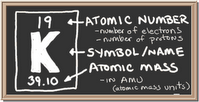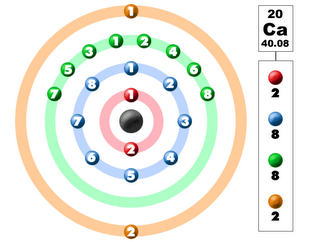 Most of what I'm writing about these days many of you might already know, but I want to go ahead and put it down because I read, and read, and read, and, hey, maybe I can share some information with someone who doesn't already have it. it's the Geek teacher in me, I guess.
Most of what I'm writing about these days many of you might already know, but I want to go ahead and put it down because I read, and read, and read, and, hey, maybe I can share some information with someone who doesn't already have it. it's the Geek teacher in me, I guess.I've spent a lot of time not only studying sports nutrition on my own, but also nutrition in generally because I'm soley responsible for the nutrition of three big-boned endurance athletes in our household.
First off, muscles can only contract in the presense of calcium, potassium and sodium. That isn't just important for your legs, but as well for the biggest and most important muscle, your heart.
Second, did you know that for each liter (about two pints - see my earlier post on hydration) of sweat you lose, you lose a whole BUNCH of electrolytes? Here's some numbers for you (Lower numbers are based on a research report; higher numbers are based on information I received from Gatorade.)
Per liter of sweat lost:
800 - 1500 mg of Sodium
200 - 390 mg of Potassium
20 - 120 mg of Calcium
5 - 48 mg of Magnsesium
Obviously, this may depend on a lot of factors. For instance, I don't sweat much, and when I do, it's not very salty. Sweet Baboo, on the other hand, actually gets crystals of salt right on his face when he sweats.
It's really the most amazing thing. A regular crystal garden grows, right there on his face.
Sodium and Potassium. But back to endurance nutrition during races. P
 otassium and Sodium are pretty important to have while racing, because if you don't replace them and then drink a whole slew of water, you can get cramps at best, and hyponatremia at worst. I've never had muscle cramps before, and not because I'm some sort of electrolyte Goddess, either. Nope, I figure that I haven't had them because I'm either 1) lucky, or 2) I don't really go all that hard.
otassium and Sodium are pretty important to have while racing, because if you don't replace them and then drink a whole slew of water, you can get cramps at best, and hyponatremia at worst. I've never had muscle cramps before, and not because I'm some sort of electrolyte Goddess, either. Nope, I figure that I haven't had them because I'm either 1) lucky, or 2) I don't really go all that hard.Probably the latter.
Sodium you can get from salt. Potassium is something that can mess with your heart rythem (I always spell that wrong. It will do you no good to correct me.) so you don't want to mess with it. Foods with high sources of potassium include OJ, potatoes, and bananas, among others. Now you know why you see so many oranges, bananas, and potatoes at races. They are endurance superfoods.
Calcium. Did you know that after about age 30 your body slows WAYYYY down in storing calcium in your bone? Whenever it needs some to do stuff, it goes and gets it from--you guessed it--your bones. Then, like a spoiled child, it doesn't put it back when it's done, so you actually go into a net negative amount as you age. Your body also takes it to stablize the pH of your blood when it's too acidic, but I don't know as m
 uch as about that as I'd like to, so I won't comment on it much further.
uch as about that as I'd like to, so I won't comment on it much further.It's been estimated that nearly 1/3 of adults have lower bone mass, called osteopena. Most don't know it unless it developes further into osteoporosis, which can cause bones to break just by falling down, OR they start engaging in activites that put undo stress on their frame, and start developing stress fractures. So, if you're involved in endurance sports, you've got more than a couple reasons to get your daily Calcium (and vitamin D). There's also calcium in dairy products, too, but be careful: there's cholesterol in them as well, even the fat-free ones.
Now here's what I know from being a degreed rock hound: Calcium, in mineral form, is one of the most abundant minerals in the earth's crust. Calcium doesn't "expire" - none of the metals (sodium, potassium, magnesium, iron) do. If you can get a deal and get them for half price because they've "expired," go ahead and grab 'em, so long as they haven't been exposed to moisture.
As well, there is an increasing number of drinks fortified with calcium in it, like OJ (which also gives you potassium!) It's absorbed even better along with vitamin C, so try to take it with vitamin C. Calcium can interfer with iron absorption, so if you use supplements, take them seperately. Iron is important because it transports oxygen in your blood (you blood is red because, basically, it's "rusty") so you don't want to get low on iron.
Magnesium. Not really an electrolyte, but essential nonetheless. Problems associated with low magnesium include anxiety disorders, high blood pressure, and osteoporosis.
In any case, you want to make sure you replenish those. In workouts lasting less than an hour or so (none of my races qualifies) you probably don't need to worry so much during the race, but replenish afterwards.
So check those labels. Make sure that your hydration includes a bit of all four of those metal ions we call electrolytes. (Shameless advertising, I admit. Since I got 3rd place in the contest, I get a free months' supply, but I was already using it anyway.)
On Friday, after I've spent a day stuffing myself silly, I'll write about what I know about carbs. Have a great Turkey Trek/Trot, and have a great Thanksgiving!!
...


Good stuff! That makes Rolaids make sense during an endurance event.... except the magnesium in them has a laxative effect on me (witness: Epsom Salts is mag sulfate) (I think)
ReplyDeleteAnd congrats on your BIG RECOGNITION!!
Yeah, I forgot to mention, too much Mg can have that affect on people, and some might be more sensitive. I don't know how much is in Rolaids, but maybe its too much!
ReplyDeleteA wise athlete will do whatever it takes to make sure they stay healthy for every game; the more you eat right the better you will perform. A determination of how much how much fat, carbohydrates, and proteins you can intake is best determined by calculating your body and fat mass index.
ReplyDeleteSport Nutrition Guide
christine, your link to the "Sport Nutrition Guide" does not appear to work.
ReplyDeleteI get a crazy salt crystal thing happening when I sweat too - it's like I rolled in sand. It's why I've been hyper-concerned about figuring out the nutrition stuff before I increase distances next summer.
ReplyDeleteThis comment has been removed by a blog administrator.
ReplyDelete